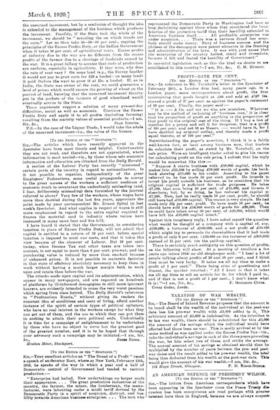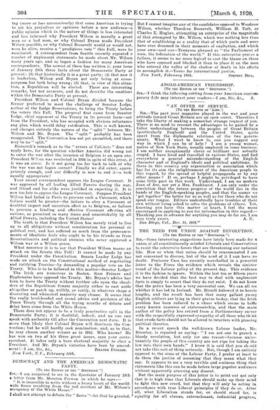AN AMERICAN DEFENCE OF PRESIDENT WILSON. [To THZ EDITOR 07
THE " SPECTATOR."]
SIR,—The letters from American correspondents which have been appearing in the Spectator since the Peace Treaty din cussion has been conspicuous are read perhaps with greater interest here than in England, because we are always suspeoa
ing (more or less unconsciously) that some American is trying to air his prejudices or opinions before a new audience—a public opinion which in the nature of things is less interested and less informed why President Wilson is morally a great man or a bad man, or why Colonel Bryan made President Wilson possible, or why Colonel Roosevelt would or would not, were he alive, receive a " prodigious vote " this Fall, were he nominated. A correspondent from Seattle recently repeated a number of unpleasant statements he made about Mr. Wilson many years ago, and so began a fashion for many American correspondents. The newest of these has written ii_ your issue of January 24th three facts about the Democratic Party at present : (1) that historically it is a great party; (2) that now it is leaderless, Wilson and Bryan not only being at cross- purposes but both being wrong; (3) that, in view of this situa- tion, a Republican will be elected. These are interesting remarks, but not accurate, and do not describe the emotions within the Democratic Party at present.
President Wilson and Colonel Bryan divided because the former preferred to meet the challenge of Senator Lodge, author of the Lodge Reservations, to bring the Treaty before the voters this Fall. The proposal first came from Senator Lodge, chief opponent of the Treaty in its present form—not from the President, who has accepted with obvious reluctance any plan which would delay ratification. This is well known, and changes entirely the nature of the "split" between Mr. Wilson and Mr. Bryan. The " split " probably has been exaggerated. The Convention has not yet assembled, and there may be no " split."
Bismarck's remark as to the " errors of Cabinets " does not apply here, for the question whether America did wrong not to enter the war after the invasion of Belgium is an open one. President Wil-on was re-elected in 1916 in spite of this error, if it was an error. Is it not going too far back to talk of why the war was not begun sooner? Finally we did enter, appro- priately enough, and our difficulty is now to end it—a task equally appropriate!
Your recent correspondent opposes the League Covenant. It was approved by all leading Allied Powers during the war, and friend and foe alike were justified in expecting it. It is now too late to oppose the League Covenant. Suppose President Wilson hail failed in Paris to procure such a Covenant, which failure would be greater—the failure to obey a Covenant of doubtful import and uncertain effect as to Belgium, or failure to procure a binding and effective Covenant affecting all nations, as promised so many times and unmistakably by all Allied Powers, including the United States?
The truth is that President Wilson has merely tried to live ap to all obligations without consideration for personal or political cost, and has suffered as much from the pronounce- ments of idealistic fools who ought to be his friends as from Reservationists and political enemies who never approved a Wilson war or a Wilson peace.
What nonsense it is to say that President Wilson means an attack on the Senate this Fall! It cannot be made by any President under the Constitution. Senate Leader Lodge has made an attack on the Constitutional method of negotiating and ratifying Treaties—by demanding a popular vote on the Treaty. Who is to be followed in this matter—Senator Lodge?
The Irish are numerous in Boston. Sinn Feiners and Hyphenates have opposed the Treaty. Mr. Bryan's advice has been to leave the Treaty without further ado upon the shoul- ders of the Republican Senate majority either to cast aside altogether or patch up, nullify, or ratify, in whatever shape a dissenting and whimsical majority may choose. It seems that the really level-headed and sound advice and guidance of the Peace Treaty through all the trying months of debate and delay have come from the White House.
There does not appear to be a truly penetrative split in the Democratic Party; it is doubtful, indeed; and no one can speak with authority till after the Convention next June. It is more than likely that Colonel Bryan will dominate the Con- vention; but he will hardly seek nomination; and, as to that, he may choose another winner as in 1912. Who knows? He has won on two of his three great issues, says your corre- spondent. It takes only a bare electoral majority to elect a President. And Mr. Bryan's victories have been by amend- ment!—I am, Sir, S:c., &LUGER ENGLISH.
New York, N.Y., February 11th.











































 Previous page
Previous page